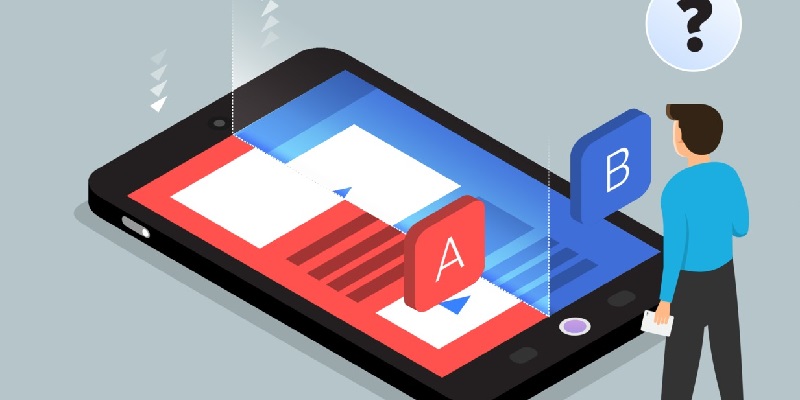Artificial Intelligence (AI) is no longer a term associated only with science fiction or futuristic technology. In fact, AI has become a crucial and integral part of many industries, including marketing. AI technology has made it possible for marketers to conduct A/B testing with greater efficiency and accuracy than ever before. A/B testing, also known as split testing, is a method used in marketing to compare two different versions of a webpage, email, or other marketing material, to see which one performs better. With AI, the potential benefits of A/B testing are multiplied, allowing for greater insights, improved testing methodologies, and more effective marketing strategies.
The Impact of AI on Marketing Automation
One key area where AI has had a significant impact is in marketing automation. Using AI in marketing automation allows for more efficient and targeted campaigns, personalized experiences, and increased ROI. AI technology enables marketers to analyze vast amounts of data quickly, providing insights that would otherwise require a human analyst to take months or even years. This has led to the creation of more sophisticated marketing strategies that are tailored to specific audiences and market segments.
A/B Testing: Definition and Methodology
A/B testing is a method of comparing two versions of marketing material to determine which one is more effective. Typically, it involves dividing a sample of users into two groups, with each group receiving a different version of the marketing material. The performance of each version is then measured using key performance indicators (KPIs) such as conversion rates, click-through rates, and engagement rates. A/B testing enables marketers to make data-driven decisions about which marketing materials and strategies are most effective for their target audience.
Ways in which AI can Benefit A/B Testing
AI can be a game-changer in A/B testing. The following are some ways in which AI can benefit A/B testing:
Increased efficiency
AI can analyze vast amounts of data quickly, providing insights faster than a human analyst could. This frees up marketers to focus on other areas of their marketing strategy, such as creating compelling content or developing targeted audience segments.
Real-Time Feedback
The success or failure of an A/B test is typically measured using key performance indicators (KPIs). With AI, these metrics can be analyzed in real-time, providing instant feedback on the performance of your test. This allows marketers to quickly iterate on their testing strategy and make decisions about which version of their marketing material is most effective.
Better Insights
AI technology enables marketers to conduct more sophisticated testing methodologies, such as multivariate testing. Multivariate testing allows marketers to test multiple variables at once, providing more detailed insights into which specific elements of their marketing materials are most effective.
Measuring success and failure in A/B testing
The success or failure of an A/B test is typically measured using key performance indicators (KPIs). These metrics can include conversion rates, click-through rates, engagement rates, and other relevant metrics. With AI, these metrics can be analyzed in real-time, providing instant feedback on the performance of your test.
Using AI to analyze metrics in real time
AI technology makes it possible to analyze data in real-time, providing marketers with instant feedback on the performance of their A/B testing. This allows marketers to iterate quickly on their testing strategy and make decisions about which version of their marketing materials is most effective.
Recommendations for implementing AI in A/B testing
To effectively leverage AI in your A/B testing strategy, consider the following recommendations:
Start with Clear Goals
Before conducting an A/B test with AI, it’s essential to define clear goals and objectives. This will help ensure that your testing strategy is focused, and that you are testing the right variables to achieve your desired outcomes.
Choose the right AI tools
Choosing the right AI tools is critical to the success of your A/B testing strategy. Make sure you select tools that are aligned with your specific goals and objectives, and that are easy to use and integrate with your existing marketing technology stack.
Combine AI with human expertise
While AI can provide valuable insights, it should be used as a tool to complement, not replace, human expertise. It is essential to maintain a balance between the use of technology and the human element to achieve the best results from your A/B testing strategy.
The Role of Human Expertise in A/B Testing with AI
Human expertise is critical to the success of A/B testing with AI. Marketers must have a deep understanding of their target audience and market segment to design an effective testing strategy. Human intuition, creativity, and critical thinking are what enable marketers to see beyond the data and develop hypotheses about what will work best for their audience.
The success of AI in A/B testing largely depends on how well it is implemented, how clear the initial goals are, and how effectively you can balance the use of technology with a deep understanding of your audience. AI technology has made it possible for marketers to conduct A/B testing with greater efficiency, accuracy, and speed. By leveraging AI, marketers can make data-driven decisions about which marketing materials and strategies are most effective for their target audience. With the right tools and strategies in place, the potential benefits of AI in A/B testing are enormous, allowing marketers to create more personalized and effective marketing experiences for their customers.

